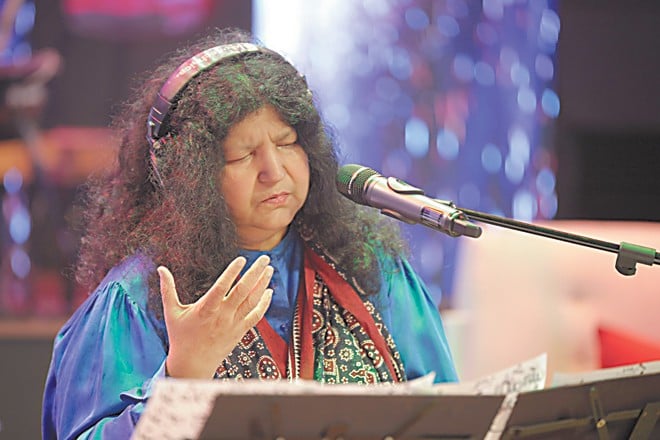
Abida Perveen talks about Coke Studio, the late Amjad Sabri and show us what it means to be a true Sufi

instep interview
Abida Parveen has been Coke Studio’s saving grace this season. She enthralled audiences with ‘Aaqa’, a duet with Ali Sethi, and then again with ‘Maula-e-Kull’, a 10 minute solo that has been on the hearts and minds of anyone who has heard it. So for Coke Studio, Abida ji has turned out to be a much needed pillar that allowed it to stand on rather shaky ground. And speaking of shaky, we were curious to know what Abida ji thought of Coke Studio?
"Making music is a very, very difficult business," Abida ji said as we caught up after the release of ‘Maula-e-Kull’. I was surprised to hear that because everything she does seems so effortless; it’s hard to imagine a world where Abida Parveen found it difficult to sing. She explained how Coke Studio specially makes all the singers train and practice numerous times. "We start rehearsing nearly three months beforehand and then meet repeatedly over that period. There are little changes that keep coming up, as the producers or the musicians keep revising the work. So we meet and rehearse those changes till the day of the shoot." She added that there are many people involved so it is a time consuming process.
She sounded weary of the process, and we don’t blame her. Being used to large audiences and mehfils where she is in control of her singing, what does a controlled environment like Coke Studio do to such a free spirit? "A mehfil is much different from Coke Studio’s recordings. Even though both scenarios have live performances, in a mehfil I’ll be singing 8 to 12 kalaam in one performance, where as in a Coke Studio song, I have to sing 2 or 3, and those too have to be very well rehearsed." But Abida ji said she enjoyed the outcome of all these rehearsals. She specially enjoyed the chance she got to work with other singers, having performed with Rahat Fateh Ali Khan in previous Coke Studio seasons.
This season, she collaborated with Ali Sethi to produce ‘Aaqa’, a hauntingly beautiful melody that truly shows man’s utter submission to God. What did she think of working with such new artists? Interestingly, she was curious to know what Ali Sethi thought about working with her. After hearing that he was very nervous, Abida ji added laughingly "I get nervous before performing even to this day. It feels like my first performance and I pray to God that I’m able to do justice!" She also sang praises for Sethi, adding that it’s a good thing to feel nervous before performing as it ensures quality work. "Sethi really enjoys his work and that was evident with the way he sang. He was very good; there is no doubt about it."
There is another name that she spoke about fondly: the late Amjad Sabri. "He has also sung for Coke Studio and what an amazing job he has done. He was the most hardworking out of all of us. There is magic in his voice." She gave Sabri a very exalted status, saying that people like him are so lost in their devotion to God, and their music, that they don’t need to worry about the world.
"His whole family is on another level. They take their music very seriously as they spend hours singing and rehearsing. Sometimes their riaz will start at 7 pm and go on till 4, 5 in the morning."
However, a matter of concern after Sabri’s tragic death has been the safety of our artists, with many artists protesting the lack of security available. Abida ji is ever the mystic when she says, "Just pray to Allah. Inshallah he will do better." When asked about how she manages her security, Abida ji quizzically responded "What security? I have my God’s security."
Another threat to our music is the dying appreciation and learning of classical forms of music, where the contemporary sound is becoming more and more electronic. But Abida ji disagreed when I asked her to comment on it. "There is a lot of appreciation and demand for Sufi music all over the world. Only last year I got invited to perform at the Manchester Festival and now I have been invited again to London to perform. Westerners are really fond of our music!"However, Abida ji felt that the Pakistani youth needs to learn Western music properly if that’s the kind of music they want to make. "Right now, it’s copying. If we are not learning their art form and then applying it, then we’re copying it." She stressed on the importance of learning any art form. "You have to spend time and energy before mastering any kind of music, whether contemporary or classical. You have to learn it first."
All in all, Abida ji is quite content with the way things are going musically, in her life as well as globally. Or perhaps that is simply the Sufi in her that has all her faith in God, which makes her not worry for anything. "Just pray, and all will be well," is her answer to every stress or concern, and we are glad to see the real life manifestation of Sufi music in her every-day life as well.